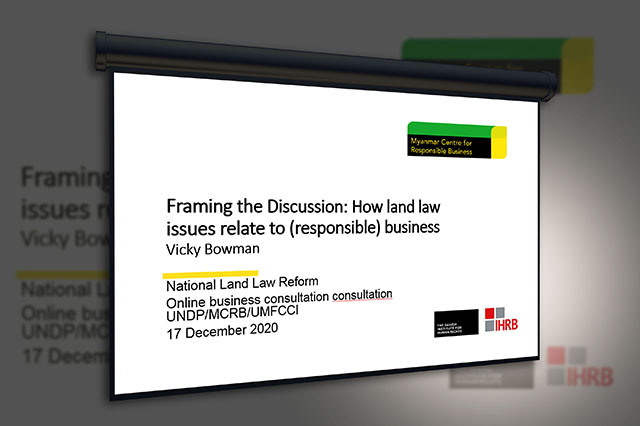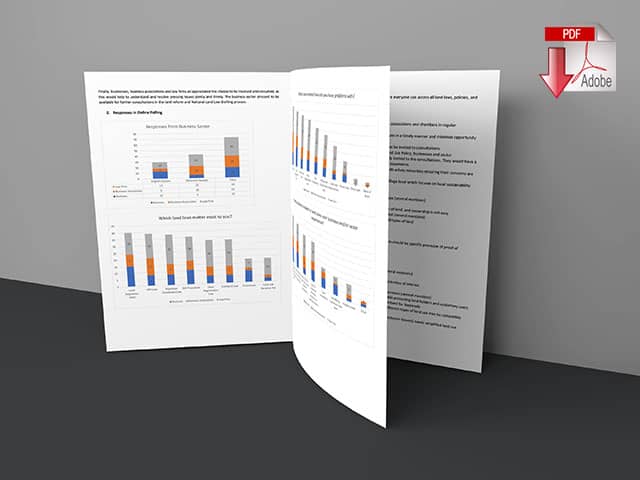Business Consultation on National Land Law Reform

On 17 December, Myanmar Centre for Responsible Business (MCRB) together with the United Nations Development Programme (UNDP) and the Union of Myanmar Federation of Chambers of Commerce and Industries (UMFCCI) organized two separate online consultations (English and Burmese language) on “Myanmar land laws: currents problems, possible solutions”.
The objectives of the online business consultation were firstly, to raise business awareness of the process and status of Myanmar’s land governance reform, and how business can engage. Secondly the aim was to obtain specific and relevant feedback from the business community on aspects of current laws relating to land, and their administration which are, and are not, functioning well. The consultation aimed to identify problems and gaps in current land laws, and suggestions for improvement in processes, including issues to be covered in the National Land Law, or amendments needed to other laws.
The English session was attended by 70 participants and the Myanmar session by 101 participants. These were mainly from national and international businesses, business associations, development partners, legal advisors, environmental consultants as well as a few civil society organizations. Participants were briefed on the current main land laws, the National Land Use Policy, and the National Land Law process. They were asked interactively through polling and in discussions for their views and comments on current problems and necessary amendments to Myanmar’s land laws, some of which date back to the 1880s.
In her presentation, Vicky Bowman, MCRB Director highlighted there are many land related laws in Myanmar, and these interact – not always smoothly - with more recent sectoral laws and environmental laws as well as laws on investment. Governments need to create a rights-protecting and consistent regulatory and policy climate that allows businesses to be responsible. She highlighted the recent initiatives to establish a ‘Project Bank’ and a Land Bank. These offer opportunities to apply the complete legal framework correctly, including on environmental protection, and ‘screen’ out unsuitable projects. However, there are also risks. For example, the Draft 5.3 of the Myanmar Economic Resilience and Reform Plan (MERRP) proposes to ‘Identify, screen and assess land plots available for potential commercial plantation (in the agriculture, aquaculture and polyculture sectors) for inclusion in the Land Bank, and make these available to private sector investors, or via joint partnerships with the State’. However, in the absence of the definition of customary tenure, expected to be included in the National Land Law, this would be a potential driver of conflict with local ethnic communities if customarily held land were considered ‘available’. Vicky also noted that the Myanmar National Human Rights Commission (MNHRC) says that land still drives the largest number of complaints they receive.
The lack of a definition of customary tenure is one of the main problems concerning land use. The interaction of the 2015 Ethnic Rights Protection Law and land laws is unclear. Furthermore, the 2019 Land Acquisition, Resettlement and Rehabilitation Law (LARRL, not yet in force) takes a wide definition of ‘public interest’, which is not in line with international standards and or laws in the region such as in India. The multiple risks arising out of the legal framework mean investors should do due diligence including learning the history, ownership and current use of the land and not rely solely on official documents. As far as possible, investors should seek to apply IFC Performance Standards (particularly 1,5 and 7).
The powerpoints presented by MCRB are available in both English and Burmese.
As the online events also conducted interactive polling and discussions the overall results are available in both English and Burmese.
Of all the most relevant legal and procedural frameworks for land and investment, participants identified the Myanmar Investment Law/Rules and DICA’s MyCo companies register as those which worked best. Land laws such as the Vacant Fallow and Virgin Land Law, LARRL, and the Farmland Law, were identified as particularly problematic. Suggestions made to addresses these were:
-
Government officials from relevant government departments should coordinate amongst one another, comply with, and enforce the law consistently.
-
Ensure environmental and social issues are fully considered in all laws and their application, and that they are consistent.
-
Disclose land related information to public and investors.
-
Land ownership is difficult to verify for businesses, and creation of a digital Land Registry is needed.
-
Simplify and reduce the number of steps in procedures, particularly for land transfer and change of land use
-
Reduce taxes which need to be paid for transfer of land, to reduce evasion.
-
Reduce the number of government bodies involved in land administration processes, to reduce delays and corruption.
-
Revise and harmonise land laws in line with international best practices.
-
Government should include business, business associations and chambers in regular consultations on land.
 Sector-specific comments focus on the fishery, special economic zones, real estate, rubber plantation, livestock and banking and mining sectors. A full report is available here.
Sector-specific comments focus on the fishery, special economic zones, real estate, rubber plantation, livestock and banking and mining sectors. A full report is available here.
MCRB’s work on land rights issues in Myanmar includes its Sector-wide Impact Assessments (SWIA). and specifically ICT Land Chapter, Mining Land Chapter, Oil & Gas Land Chapter and the Tourism Chapter on Cumulative and Project Level Impacts. An earlier Land Briefing Paper on Land Rights and Business in Myanmar was also published in 2015 as well as Briefing papers on Biodiversity, Human Rights, and Business (2018). More information on the Centre’s work on Land Rights is available on the Centre’s website.
In addition, the recently published second OECD Investment Policy Review (2020) of Myanmar, conducted at the request of the Directorate of Investment and Companies Administration (DICA) includes a specific chapter on Fostering Secure and Well-Defined Land Rights, which was written by Margaret Wachenfeld, MCRB’s Senior Advisor and IHRB Senior Research Fellow. This chapter discusses the overview of Myanmar’s regulatory framework on land rights and administration. It reviews recent policy developments and reforms, identifies key remaining obstacles contributing to land tenure insecurity and administration deficiencies and recommends a number of policy reforms for addressing these challenges. OECD IPR is available in both English and Myanmar Languages.
Read also
- MCRB Expresses Concern About the Impact on Responsible Investment of the Amendments to the Virgin, Vacant and Fallow Lands Law
- MCRB submits comments to Parliament on the draft Land Acquisition Act
- Voluntary Guidelines on the Responsible Governance of Tenure (VGGT) of Land, Fisheries and Forests
- Consultation to update MCRB’s Land Rights and Business in Myanmar Briefing Paper
- MCRB/OXFAM workshop on Responsible investment in plantation agriculture, with a focus on land
 English
English မြန်မာ
မြန်မာ မြန်မာ (unicode)
မြန်မာ (unicode)










